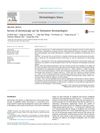 251 citations,
October 2014 in “The Journal of Clinical Endocrinology & Metabolism”
251 citations,
October 2014 in “The Journal of Clinical Endocrinology & Metabolism” The guidelines advise against using testosterone and DHEA in women for most conditions due to safety and effectiveness concerns, but suggest considering testosterone for postmenopausal women with low sexual desire.
 219 citations,
September 2009 in “European journal of epidemiology”
219 citations,
September 2009 in “European journal of epidemiology” The Rotterdam Study aims to understand various diseases in older adults.
 116 citations,
December 2017 in “International Journal of Women's Dermatology”
116 citations,
December 2017 in “International Journal of Women's Dermatology” Adult female acne treatment should be personalized, considering individual preferences and pregnancy, using various topical and oral medications while managing side effects and resistance.
 114 citations,
March 2018 in “PLOS Medicine”
114 citations,
March 2018 in “PLOS Medicine” Women with PCOS are more than twice as likely to develop nonalcoholic fatty liver disease.
 68 citations,
November 2011 in “The American journal of pathology”
68 citations,
November 2011 in “The American journal of pathology” Abnormal Hedgehog signaling in blood cancers may help tumors grow and resist chemotherapy, suggesting potential for targeted treatments.
 46 citations,
January 2020 in “Theranostics”
46 citations,
January 2020 in “Theranostics” Injecting a special gel with human protein particles can help hair grow.
 46 citations,
September 2014 in “Steroids”
46 citations,
September 2014 in “Steroids” Plant steroid hormones show growth, health, and medicinal benefits in various organisms, including potential for treating diseases.
 41 citations,
June 2013 in “PLOS ONE”
41 citations,
June 2013 in “PLOS ONE” Engineered skin substitutes can grow hair but have limitations like missing sebaceous glands and hair not breaking through the skin naturally.
 30 citations,
November 2018 in “EMBO Reports”
30 citations,
November 2018 in “EMBO Reports” The Ovol2-Zeb1 circuit is crucial for skin healing and hair growth by guiding cell movement and growth.
 21 citations,
May 2021 in “Patient education and counseling”
21 citations,
May 2021 in “Patient education and counseling” Managing PCOS is hard because it varies a lot, treatments are limited, and there's a lot of false information online.
 21 citations,
March 2018 in “Experimental Dermatology”
21 citations,
March 2018 in “Experimental Dermatology” The guide explains how to study human skin fat cells and their tissue, aiming to improve research and medical treatments.
 18 citations,
March 2018 in “Archives of Plastic Surgery”
18 citations,
March 2018 in “Archives of Plastic Surgery” The superficial temporal artery flap is a reliable method for reconstructing complex facial defects with minimal complications.
 18 citations,
January 1999 in “CNS Drugs”
18 citations,
January 1999 in “CNS Drugs” Some anticonvulsant drugs can cause skin reactions, ranging from mild to severe, and managing these reactions is important for patient care.
 15 citations,
January 2013 in “European Journal of Pediatrics”
15 citations,
January 2013 in “European Journal of Pediatrics” Patients with Shwachman-Diamond syndrome often get misdiagnosed due to a wide range of symptoms, including immune system problems and bone abnormalities.
 14 citations,
May 2013 in “American Journal of Physiology-endocrinology and Metabolism”
14 citations,
May 2013 in “American Journal of Physiology-endocrinology and Metabolism” Removing myelin protein zero-like 3 in mice leads to better metabolism and resistance to obesity.
 12 citations,
September 2020 in “Stem cell research & therapy”
12 citations,
September 2020 in “Stem cell research & therapy” Adult skin cell-based early-stage skin substitutes improve wound healing and hair growth in mice.
 12 citations,
January 2010 in “Pediatric Health”
12 citations,
January 2010 in “Pediatric Health” Early treatment and lifestyle changes are important for managing PCOS in young people to prevent long-term health issues.
 11 citations,
January 2019 in “Sexual Medicine”
11 citations,
January 2019 in “Sexual Medicine” Younger transgender women have surgery earlier, are mostly attracted to men, and show more preoperative depression that improves after surgery compared to older transgender women.
 11 citations,
July 2012 in “Current Opinion in Pediatrics”
11 citations,
July 2012 in “Current Opinion in Pediatrics” Skin problems can be signs of hormone-related disorders and recognizing them early is important for treatment.
 10 citations,
November 2018 in “Physiological Research”
10 citations,
November 2018 in “Physiological Research” The conclusion is that standardizing testosterone measurement methods is essential for better diagnosis accuracy in women.
 10 citations,
October 2014 in “Journal of Ovarian Research”
10 citations,
October 2014 in “Journal of Ovarian Research” The IRS-2 Asp/Asp genotype may increase the risk of PCOS in Chinese women, especially if they are not obese.
 10 citations,
January 2012 in “International Journal of Trichology”
10 citations,
January 2012 in “International Journal of Trichology” The study found no link between anxiety, vitamin B12, folate, TSH, ferritin, zinc levels, and trichodynia in telogen alopecia patients.
 10 citations,
June 2005 in “The journal of investigative dermatology/Journal of investigative dermatology”
10 citations,
June 2005 in “The journal of investigative dermatology/Journal of investigative dermatology” FP-1 is a key protein in rat hair growth, active only during the growth phase.
 9 citations,
January 2015 in “Springer eBooks”
9 citations,
January 2015 in “Springer eBooks” The document concludes that managing PCOS involves treating symptoms, regulating periods, and reducing health risks, with specific medications for fertility and metabolic issues.
 8 citations,
May 2021 in “Reproductive Biology and Endocrinology”
8 citations,
May 2021 in “Reproductive Biology and Endocrinology” Different levels of anti-Müllerian hormone can help diagnose polycystic ovary syndrome in women of different ages.
 5 citations,
July 2021 in “Basic & Clinical Pharmacology & Toxicology”
5 citations,
July 2021 in “Basic & Clinical Pharmacology & Toxicology” Melatonin may protect ear cells from damage caused by nicotine.
 5 citations,
January 2021 in “Skin appendage disorders”
5 citations,
January 2021 in “Skin appendage disorders” Smoking is linked to more hair loss and premature graying compared to nonsmokers.
 5 citations,
May 2017 in “Current Opinion in Pediatrics”
5 citations,
May 2017 in “Current Opinion in Pediatrics” Hormonal therapies are safe and effective for treating acne in female adolescents, with specific treatments for those with endocrine disorders.
 4 citations,
December 2020 in “Mammalian genome”
4 citations,
December 2020 in “Mammalian genome” Harlequin mutant mice have hair loss due to low AIF protein levels and retroviral element activity.
 3 citations,
July 2015 in “Dermatologica Sinica”
3 citations,
July 2015 in “Dermatologica Sinica” About half of Taiwanese dermatologists use dermoscopy, mainly to improve diagnosis and detect cancer early, but cost and lack of training limit its wider use.





























